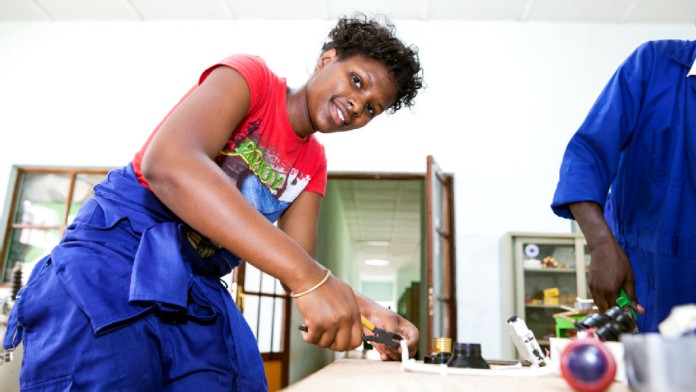
As of: 04/2023
The Senegalese education system is facing the challenge of increasing forward-looking training and education that focuses on labour market needs in order to employ the job-seeking and predominantly youthful Senegalese population. At the same time, there is a shortage of skilled workers for the potential economic growth area of developing and using renewable energy and energy-efficient measures. One solution to this is the establishment of a network of vocational academies, the ISEP (Institut superieur d'Enseignement professionnel), which the government initiated during the last reform of higher education institutions. By financing an ISEP with a grant of EUR 7 million, KfW is promoting a new and innovative project to improve the range of employment-driven training in the areas of energy and the environment in Senegal. Part of the project is an architectural competition for designing a vocational training centre, which implements requirements for climate-adapted, energy-efficient and environmentally friendly construction as well as for an educationally driven, inclusive and gender-sensitive spatial concept in construction planning.

Like many West African countries, Senegal is facing the challenge of training a predominantly youthful population (median age 18.5 years, Statista 2020) and finding employment for them. Just like the population, the Senegalese economy is also growing, and with it, the country’s energy requirements. According to International Energy Agency (IEA) forecasts, Senegal’s primary energy demand will nearly double from 2018 to 2030. Despite an increase in power generation capacities in recent years, the constantly growing demand for energy still cannot be met. The increasing energy consumption, primarily from fossil fuels, is a burden on the climate and environment. For example, in the same period from 2018 to 2030, the IEA forecasts an increase in national carbon emissions from 9 to 19 megatonnes. Despite a large number of private and public initiatives, the share of renewable energies remains far below the technical and economic possibilities to this day. This is very regrettable, especially as this as yet unsaturated market offers significant employment potential for a young and growing population of working age.
The aim of the promotion is to improve the offering of employment-oriented training, in particular in the areas of renewables and energy efficiency. This contributes to the national targets with regard to the climate-friendly expansion of the energy supply and to increasing the target group’s income and employment opportunities. The project includes the planning and construction of the ISEP and providing equipment, as well as accompanying consulting services for the implementation and use of the infrastructure.
The training areas and the infrastructure they require are selected together with the Senegalese Ministry for Higher Education, which is the project-executing agency, and GIZ, which advises the Ministry on the development of curricula, among other things. In addition, in cooperation with the GIZ project “Sport for Development”, sports education measures will be promoted, and the necessary sports facilities will be built.
The building design will be chosen using an architectural ideas competition. The requirements include holistic site planning, climate-adapted, energy-efficient and environmentally friendly construction and an educationally useful, inclusive and gender-sensitive space concept. This approach can significantly improve the quality of the building and create a “campus vert” with a showcase character. Building design that requires as little maintenance as possible as well as the development of an operation and maintenance concept and the corresponding training of personnel ensures the sustainable operation of the promoted vocational training centre. The project aims to specifically support women in their training and address them explicitly through gender-appropriate infrastructure design as well as establishing childcare and information campaigns.
The expected medium and long-term impact of the promoted ISEP is that improving offerings and access to employment-oriented higher education in the areas of renewable energy, energy efficiency and environment will lead to improved employment and income opportunities and contribute to the decarbonisation of the Senegalese economy and the energy sector. The target group primarily includes young people and young adults. The various measures are sometimes aimed at school leavers seeking either training or professional reorientation, those leaving the education system who want to continue their education, and particularly vulnerable young people and young adults. Women should also be addressed in particular, as they are currently underrepresented in technical professions. The module thus contributes to the promotion of growth and employment by strengthening vocational training relevant to the labour market.
The project contributes to the achievement of these following United Nations Sustainable Development Goals:
KfW Group
KfW Development Bank
Climate and Energy Competence Centre
katrin.enting-pauw@kfw.de
Competence Centre for Economics, Jobs, Rural Development
Health, Education and Social Protection West Africa
Share page
To share the content of this page with your network, click on one of the icons below.
Note on data protection: When you share content, your personal data is transferred to the selected network.
Data protection
Alternatively, you can also copy the short link: https://www.kfw-entwicklungsbank.de/s/enzBrtXZ
Copy link Link copied